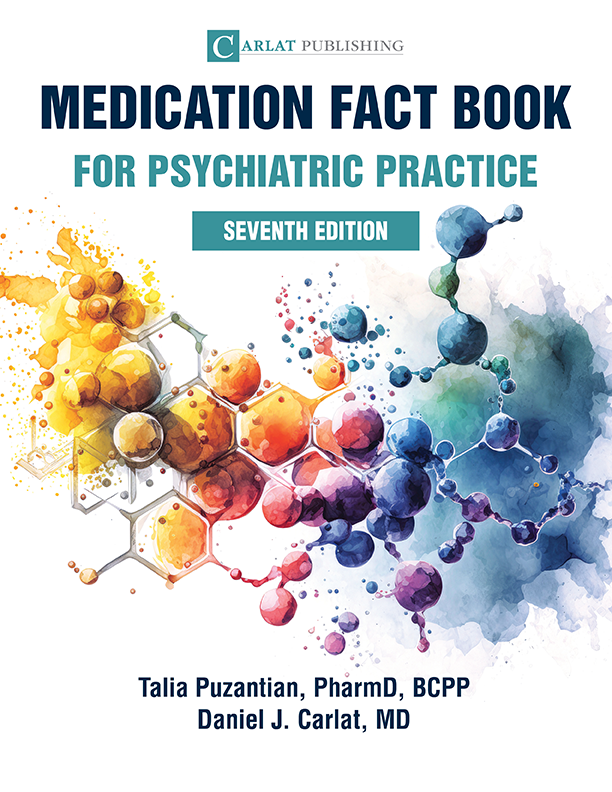Home » Treating Postpartum Depression: A Look at the Evidence
Treating Postpartum Depression: A Look at the Evidence
October 1, 2005
From The Carlat Psychiatry Report
Daniel Carlat, MD
Dr. Carlat has disclosed that he has no significant relationships with or financial interests in any commercial companies pertaining to this educational activity.
What is postpartum depression (PPD), and why does it occur? PPD is generally defined as major depressive symptoms occurring within three months of childbirth. Don’t confuse PPD with the very common postpartum blues, a phenomenon that occurs in over half of women who give birth, peaks about four days after delivery, and fully remits by 10 days postpartum (N Engl J Med 2002; 347:194-199).
About 13% of women experience depression after giving birth, which is significantly higher than the overall one-year incidence of depression in women. Women with a prior history of PPD have about a 30% risk of depression after subsequent pregnancies (Acta Psychiatr Scand 1985; 71:451-457).
Clearly, the postpartum period is a significant, specific trigger of depression in women. But is it a psychosocial or hormonal trigger? Most of us explain PPD to patients as a hormonal problem, but is there any solid evidence that this is true? Fortunately, there is. Sixteen women (eight with a history of PPD, eight with no such history) were enrolled in a study in which they were given leuprolide, an anti-hormone that causes estrogen and progesterone to plummet to post-partum levels. Five of the eight women with PPD histories developed depression, while none of the other women did. This implies that certain women are specifically vulnerable to the hormonal changes accompanying childbirth (Am J Psychiatry 2000; 157:924-30).
Do antidepressants work in PPD? “Of course they do,” you answer. And while most of the experts in the field would agree with you, you’d actually be on very shaky ground according to evidence-based psychiatry. Incredibly, only two placebo-controlled trials of antidepressants for PPD have been published. Both have the same first author, Katherine Wisner, and they yielded absolutely contradictory results.
In the first study, which was the larger of the two, non-depressed women who had previous histories of PPD were randomly assigned to receive either nortriptyline (titrated to a mean serum level of 83 ng/mL; the mean dose was not reported) or placebo. Women began treatment immediately postpartum and continued for 20 weeks. The results? Of 26 women on nortriptyline (NT), six (23%) suffered a recurrence of PPD, and of 25 women on placebo, six (24%) suffered recurrence. Thus, NT yielded no benefit in terms of preventing a recurrence of PPD (J Clin Psychiatry 2001; 62:82-86).
The second study had the same research design, but compared Zoloft (sertraline) rather than NT to placebo. There were far fewer subjects in this study, but the results were more heartening. Of 14 women on Zoloft (with the dose beginning at 25 mg QD for four days, increasing to 50 mg QD through week four, then 75 mg QD through week 17), only one had a recurrence (7%). Of eight women on placebo, there were four recurrences (50%). Despite the small number of subjects, this difference was statistically significant (Am J Psychiatry 2004; 161:1290-1292).
Why Zoloft should work better than NT isn’t entirely clear. There was a briefly fashionable notion that women in general respond better to SSRIs than to tricyclics, based on a much publicized study in 2000 (Am J Psychiatry 2000; 157:1445-1452). However, a later data synthesis of nine studies showed no gender differences in response to Prozac or tricyclics (Am J Psychiatry 2002; 159:1848-1854), and a more recent meta-analysis of 30 randomized placebo-controlled trials that included men and women showed no overall gender differences in response to tricyclics (Am J Psychiatry 2004; 161:370-372).
The only other controlled study of antidepressants in PPD wasn’t a clean placebo-controlled study but in some ways may be more useful. The investigators reasoned that in the real world, a woman with PPD will never be given an antidepressant without some therapy, if only a supportive chat with their PCP. Thus, rather than comparing Prozac alone with therapy, they randomly assigned 87 women with PPD to four different treatment arms: Prozac plus one cognitive behavior therapy (CBT) session, Prozac plus six CBT sessions, placebo plus one CBT session, placebo plus six CBT sessions. At 12 weeks, Prozac plus one session yielded similar benefits to placebo plus six sessions, implying that CBT may work as well as Prozac; Prozac plus six sessions didn’t work any better than Prozac plus one (BMJ 1997; 314:932-936).
In a prior issue of TCR (Sept 2004), we reviewed another study endorsing psychotherapy for PPD, that time interpersonal therapy (IPT), which helped relieve symptoms of depression far better than no treatment at all in the waiting list control (Arch Gen Psychiatry 2000; 57:1039- 1045).
In the end, no matter how inconclusive the evidence, we need to do what we can to treat a problem that can cause damage to both mother and infant, and this will usually involve a combination of SSRIs and psychotherapy.
TCR VERDICT
Zoloft, Prozac, IPT, CBT: They are all worth a try in postpartum depression.
General PsychiatryAbout 13% of women experience depression after giving birth, which is significantly higher than the overall one-year incidence of depression in women. Women with a prior history of PPD have about a 30% risk of depression after subsequent pregnancies (Acta Psychiatr Scand 1985; 71:451-457).
Clearly, the postpartum period is a significant, specific trigger of depression in women. But is it a psychosocial or hormonal trigger? Most of us explain PPD to patients as a hormonal problem, but is there any solid evidence that this is true? Fortunately, there is. Sixteen women (eight with a history of PPD, eight with no such history) were enrolled in a study in which they were given leuprolide, an anti-hormone that causes estrogen and progesterone to plummet to post-partum levels. Five of the eight women with PPD histories developed depression, while none of the other women did. This implies that certain women are specifically vulnerable to the hormonal changes accompanying childbirth (Am J Psychiatry 2000; 157:924-30).
Do antidepressants work in PPD? “Of course they do,” you answer. And while most of the experts in the field would agree with you, you’d actually be on very shaky ground according to evidence-based psychiatry. Incredibly, only two placebo-controlled trials of antidepressants for PPD have been published. Both have the same first author, Katherine Wisner, and they yielded absolutely contradictory results.
In the first study, which was the larger of the two, non-depressed women who had previous histories of PPD were randomly assigned to receive either nortriptyline (titrated to a mean serum level of 83 ng/mL; the mean dose was not reported) or placebo. Women began treatment immediately postpartum and continued for 20 weeks. The results? Of 26 women on nortriptyline (NT), six (23%) suffered a recurrence of PPD, and of 25 women on placebo, six (24%) suffered recurrence. Thus, NT yielded no benefit in terms of preventing a recurrence of PPD (J Clin Psychiatry 2001; 62:82-86).
The second study had the same research design, but compared Zoloft (sertraline) rather than NT to placebo. There were far fewer subjects in this study, but the results were more heartening. Of 14 women on Zoloft (with the dose beginning at 25 mg QD for four days, increasing to 50 mg QD through week four, then 75 mg QD through week 17), only one had a recurrence (7%). Of eight women on placebo, there were four recurrences (50%). Despite the small number of subjects, this difference was statistically significant (Am J Psychiatry 2004; 161:1290-1292).
Why Zoloft should work better than NT isn’t entirely clear. There was a briefly fashionable notion that women in general respond better to SSRIs than to tricyclics, based on a much publicized study in 2000 (Am J Psychiatry 2000; 157:1445-1452). However, a later data synthesis of nine studies showed no gender differences in response to Prozac or tricyclics (Am J Psychiatry 2002; 159:1848-1854), and a more recent meta-analysis of 30 randomized placebo-controlled trials that included men and women showed no overall gender differences in response to tricyclics (Am J Psychiatry 2004; 161:370-372).
The only other controlled study of antidepressants in PPD wasn’t a clean placebo-controlled study but in some ways may be more useful. The investigators reasoned that in the real world, a woman with PPD will never be given an antidepressant without some therapy, if only a supportive chat with their PCP. Thus, rather than comparing Prozac alone with therapy, they randomly assigned 87 women with PPD to four different treatment arms: Prozac plus one cognitive behavior therapy (CBT) session, Prozac plus six CBT sessions, placebo plus one CBT session, placebo plus six CBT sessions. At 12 weeks, Prozac plus one session yielded similar benefits to placebo plus six sessions, implying that CBT may work as well as Prozac; Prozac plus six sessions didn’t work any better than Prozac plus one (BMJ 1997; 314:932-936).
In a prior issue of TCR (Sept 2004), we reviewed another study endorsing psychotherapy for PPD, that time interpersonal therapy (IPT), which helped relieve symptoms of depression far better than no treatment at all in the waiting list control (Arch Gen Psychiatry 2000; 57:1039- 1045).
In the end, no matter how inconclusive the evidence, we need to do what we can to treat a problem that can cause damage to both mother and infant, and this will usually involve a combination of SSRIs and psychotherapy.
TCR VERDICT
Zoloft, Prozac, IPT, CBT: They are all worth a try in postpartum depression.

Issue Date: October 1, 2005
Table Of Contents
Recommended
Newsletters
Please see our Terms and Conditions, Privacy Policy, Subscription Agreement, Use of Cookies, and Hardware/Software Requirements to view our website.
© 2025 Carlat Publishing, LLC and Affiliates, All Rights Reserved.


_-The-Breakthrough-Antipsychotic-That-Could-Change-Everything.jpg?1729528747)



